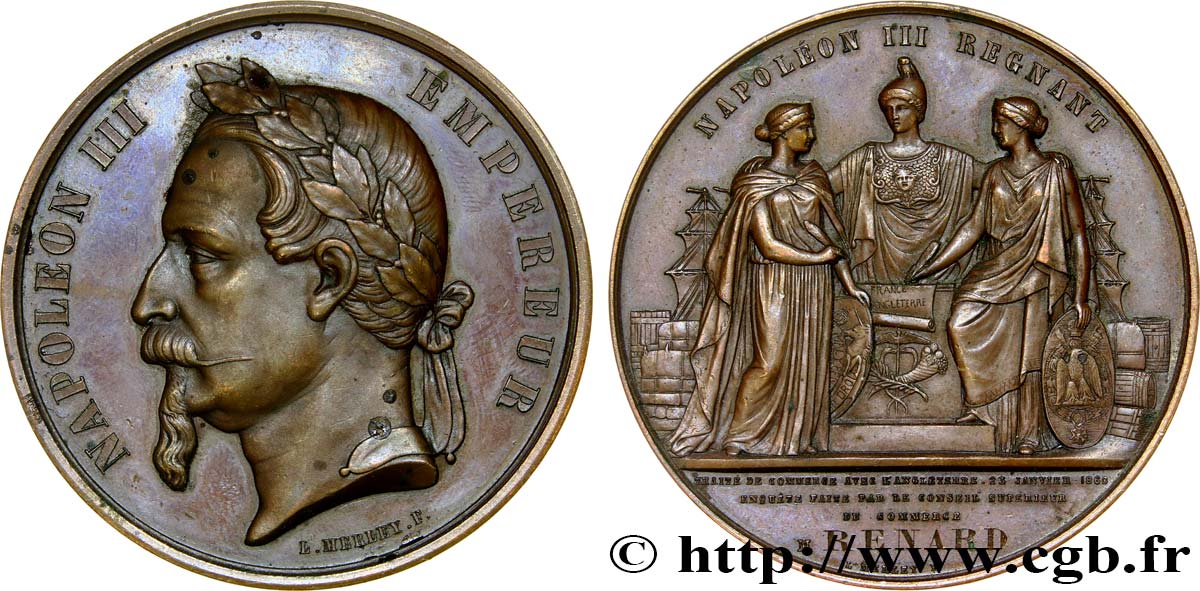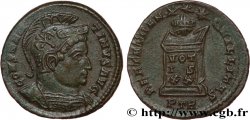E-auction 494-404647 - fme_423532 - SECOND EMPIRE Médaille, Traité de commerce franco-anglais
You must signin and be an approved bidder to bid, LOGIN TO BID. Accounts are subject to approval and the approval process takes place within 48 hours. Do not wait until the day a sale closes to register. Clicking on « bid » constitutes acceptance of the terms of use of cgb.fr private e-auctions.
Bids must be placed in whole Euro amounts only. The sale will start closing at the time stated on the item description; any bids received at the site after the closing time will not be executed. Transmission times may vary and bids could be rejected if you wait until the last second. For further information ckeck the E-auctions F.A.Q.
NO BUYER'S FEE.
NO BUYER'S FEE.
| Estimate : | 200 € |
| Price : | 82 € |
| Maximum bid : | 191 € |
| End of the sale : | 03 October 2022 18:12:00 |
| bidders : | 13 bidders |
Type : Médaille, Traité de commerce franco-anglais
Date: 1860
Mint name / Town : France
Metal : copper
Diameter : 57,5 mm
Orientation dies : 12 h.
Engraver MERLEY Louis (1815-1883)
Weight : 91 g.
Edge : lisse + abeille CUIVRE
Puncheon : Abeille (1860 - 1880) CUIVRE
Coments on the condition:
Superbe médaille avec une jolie patine sombre et brillante
Obverse
Obverse legend : NAPOLÉON III - EMPEREUR.
Obverse description : Tête laurée à gauche de Napoléon III.
Reverse
Reverse legend : NAPOLÉON III RÉGNANT // TRAITÉ DE COMMERCE AVEC L'ANGLETERRE. 23 JANVIER 1860 / ENQUÊTE FAITE PAR LE CONSEIL SUPÉRIEUR / DU COMMERCE.
Reverse description : Minerve, casquée, vêtue à l’antique, réunit la France et l'Angleterre autour d'un autel où elles signent un parchemin déroulé sur lequel figure : FRANCE / ANGLETERRE. Signé : L. MERLEY .F.
Commentary
Médaille signée L. MERLEY. F. pour Louis Merley, attribuée à Mr RENARD.
Le 15 janvier 1860, Le Moniteur, journal officiel de l'Empire français, publie une lettre de Napoléon III à son ministre d'État, le banquier Eugène Fould. « Depuis longtemps, écrit l'empereur, on proclame cette vérité qu'il faut multiplier les moyens d'échanges pour rendre le commerce florissant ; que sans concurrence l'industrie reste stationnaire et conserve des prix qui s'opposent aux progrès de la consommation. » Ce manifeste libre-échangiste annonce un changement radical de politique commerciale de la France.
Quelques jours plus tard, un traité de commerce est signé entre la France et le Royaume-Uni, les deux premières puissances économiques d'alors, par Michel Chevalier, ancien saint-simonien et Richard Cobden, qui, en 1846, après quinze ans de luttes, était parvenu à obtenir la suppression unilatérale des droits anglais sur le blé, les fameuses « corn laws ».
cf. http://www.latribune.fr/opinions/tribunes/20130701trib000773334/libre-echange-le-precedent-de-1860.html.
Medal signed L. MERLEY. F. for Louis Merley, awarded to Mr RENARD. On January 15, 1860, Le Moniteur, the official journal of the French Empire, published a letter from Napoleon III to his Minister of State, the banker Eugène Fould. \\\"For a long time,\\\" wrote the Emperor, \\\"the truth has been proclaimed that it is necessary to multiply the means of exchange to make trade flourish; that without competition, industry remains stationary and maintains prices that oppose the progress of consumption.\\\" This free-trade manifesto announced a radical change in France's commercial policy. A few days later, a trade treaty was signed between France and the United Kingdom, the two leading economic powers at the time, by Michel Chevalier, a former Saint-Simonian, and Richard Cobden, who, in 1846, after fifteen years of struggle, had succeeded in obtaining the unilateral abolition of English duties on wheat, the famous \\\"corn laws.\\\" cf. http://www.latribune.fr/opinions/tribunes/20130701trib000773334/libre-echange-le-precedent-de-1860.html
Le 15 janvier 1860, Le Moniteur, journal officiel de l'Empire français, publie une lettre de Napoléon III à son ministre d'État, le banquier Eugène Fould. « Depuis longtemps, écrit l'empereur, on proclame cette vérité qu'il faut multiplier les moyens d'échanges pour rendre le commerce florissant ; que sans concurrence l'industrie reste stationnaire et conserve des prix qui s'opposent aux progrès de la consommation. » Ce manifeste libre-échangiste annonce un changement radical de politique commerciale de la France.
Quelques jours plus tard, un traité de commerce est signé entre la France et le Royaume-Uni, les deux premières puissances économiques d'alors, par Michel Chevalier, ancien saint-simonien et Richard Cobden, qui, en 1846, après quinze ans de luttes, était parvenu à obtenir la suppression unilatérale des droits anglais sur le blé, les fameuses « corn laws ».
cf. http://www.latribune.fr/opinions/tribunes/20130701trib000773334/libre-echange-le-precedent-de-1860.html.
Medal signed L. MERLEY. F. for Louis Merley, awarded to Mr RENARD. On January 15, 1860, Le Moniteur, the official journal of the French Empire, published a letter from Napoleon III to his Minister of State, the banker Eugène Fould. \\\"For a long time,\\\" wrote the Emperor, \\\"the truth has been proclaimed that it is necessary to multiply the means of exchange to make trade flourish; that without competition, industry remains stationary and maintains prices that oppose the progress of consumption.\\\" This free-trade manifesto announced a radical change in France's commercial policy. A few days later, a trade treaty was signed between France and the United Kingdom, the two leading economic powers at the time, by Michel Chevalier, a former Saint-Simonian, and Richard Cobden, who, in 1846, after fifteen years of struggle, had succeeded in obtaining the unilateral abolition of English duties on wheat, the famous \\\"corn laws.\\\" cf. http://www.latribune.fr/opinions/tribunes/20130701trib000773334/libre-echange-le-precedent-de-1860.html








 Report a mistake
Report a mistake Print the page
Print the page Share my selection
Share my selection Ask a question
Ask a question Consign / sell
Consign / sell
 Full data
Full data















